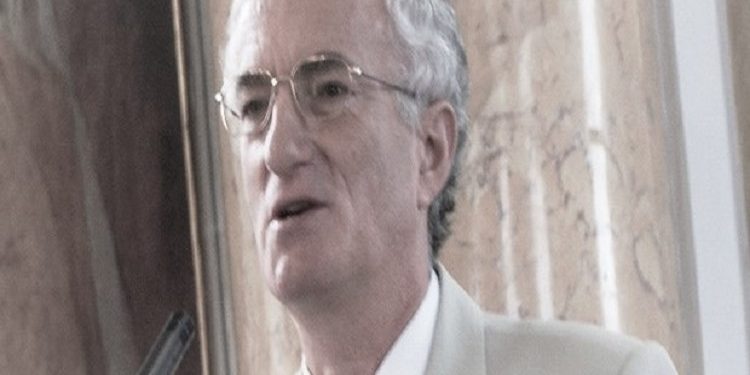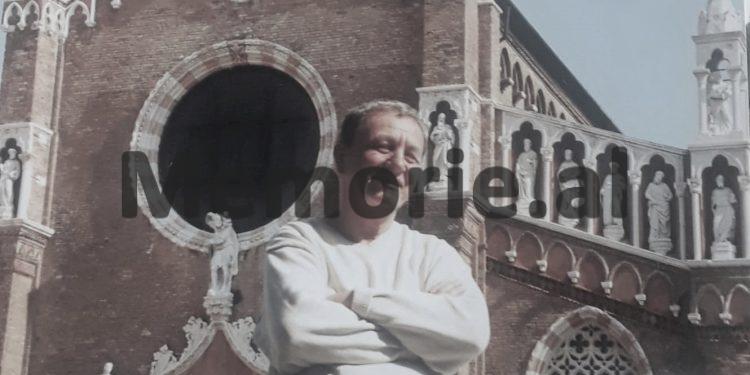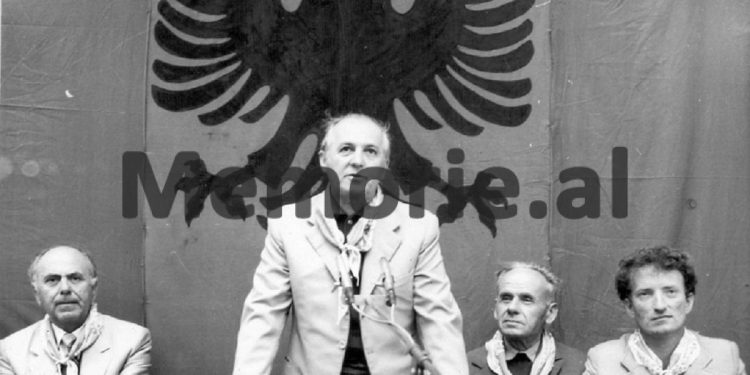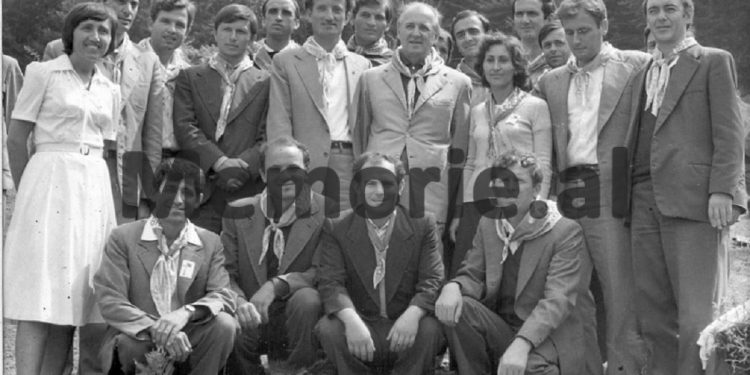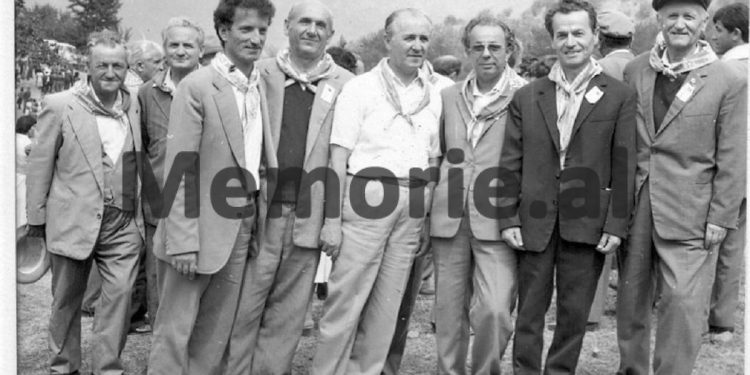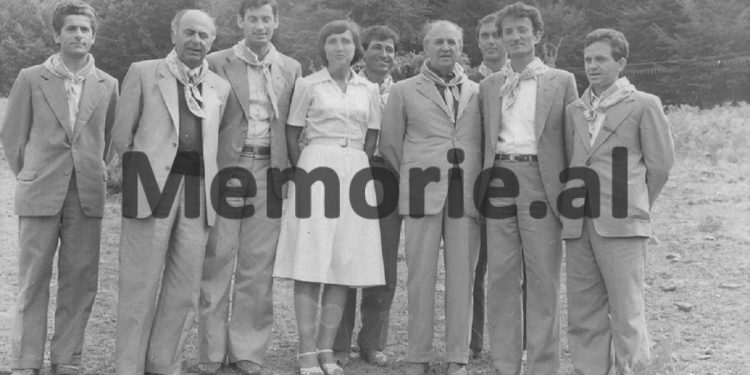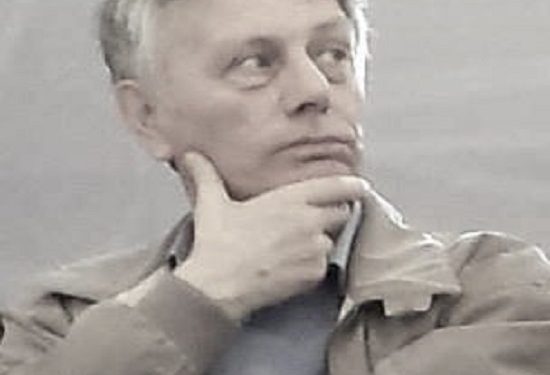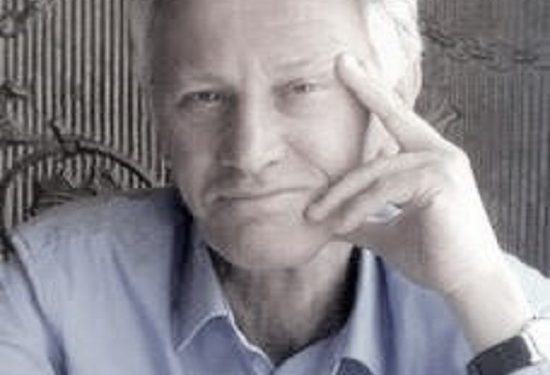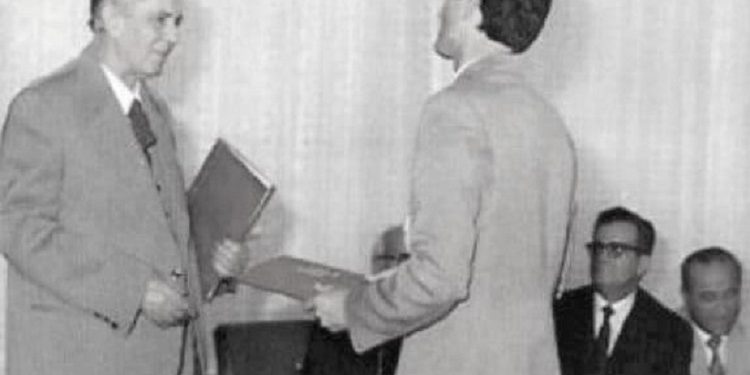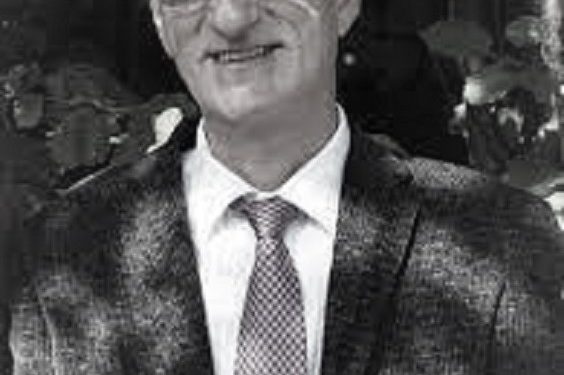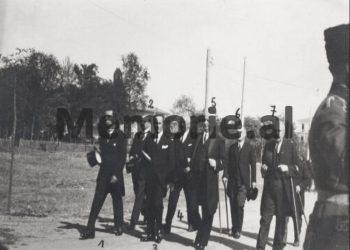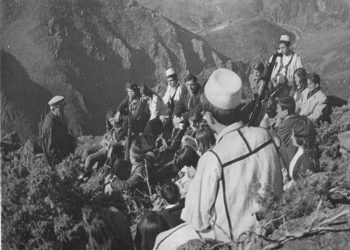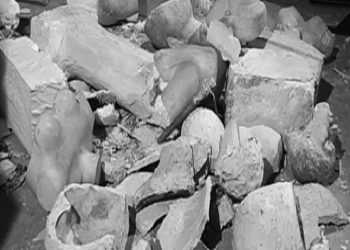By Bashkim Trenova
Part twenty-nine
Memorie.al publishes the memoirs of the well-known journalist, publicist, translator, researcher, writer, playwright and diplomat, Bashkim Trenova, who after graduating from the Faculty of History and Philology of the State University of Tirana, in 1966 was appointed a journalist at Radio Tirana in its Foreign Directorate, where he worked until 1975, when he was appointed as a journalist and head of the foreign editorial office of the newspaper ‘Zeri i Popullit’, a body of the Central Committee of the ALP. In the years 1984-1990, he served as chairman of the Publishing Branch in the General Directorate of State Archives and after the first free elections in Albania, in March 1991, he was appointed to the newspaper ‘Rilindja Demokratike’, initially as deputy / editor-in-chief and then its editor-in-chief, until 1994, when he was appointed to the Ministry of Foreign Affairs with the position of Press Director and spokesperson of that ministry. In 1997, Trenova was appointed Ambassador of Albania to the Kingdom of Belgium and to the Grand Duchy of Luxembourg. Unknown memories of Mr. Trenova, starting from the war period, his childhood, college years, professional career as a journalist and researcher at Radio Tirana, the newspaper ‘People’s Voice’ and the Central State Archive, where he served until the fall of the communist regime of Enver Hoxha, a period of time when he in different circumstances met many of his colleagues, suckers of some of the ‘reactionary families’, etc., whom he described with a rare skill in a book of memoirs published in 2012, entitled ‘Enemies of the people’ and now brings them to the readers of Memorie.al
Continued from the previous issue
“Enemies of the people”
The sentence of our colleague, ATSH journalist, by his uncle, head of Security of the Politburo!
Mehmet Shehu, passing in that world, as Agron Çobani says, took with him many “branches and leaves”. Among them, if we single out my neighbor and at the same time his barber, Xhavit Ismailaga, were five generals and 17 senior cadres of the Ministry of Internal Affairs. Among them, besides Feçor Shehu, were also Kadri Hazbiu, Llambi Peçini and Llambi Ziçishti. All of them were sentenced to death and executed. I did not know them. Kadri Hazbiu, a former member of the Politburo and Minister of Interior for 30 years, I had the opportunity to meet once, quite by chance. Gani Kodra, who was pardoned, was also present at the trial against them. I did not even know Gani Kodra and I have never met him. I first heard about him when he was arrested. I remember his name because one of my friends, Petrit Kodra, a journalist at the Albanian Telegraphic Agency, was also associated with his fate.
Gani Kodra was one of the most trusted people, and probably the most trusted of the senior leadership of the communist state. For 20 years in a row, he had been the head of the Security of the Politburo, which, as he himself stated in an interview given to the “Panorama” newspaper, he served “with a fanatical conscience”. The dictator himself had on several occasions sent letters of thanks to him for his services.
Gani was arrested on June 21, 1982, on charges of being a member of a “counter-revolutionary organization” led by Mehmet Shehu. He is accused of sabotage, he is accused of having served as a liaison between Mehmet’s son and his wife with CIA agents and, most importantly, that he wanted to physically eliminate dictator Enver Hoxha, whom at the time, as he says himself he adored her!
Until the day of his arrest, Ganiu was living with his 83-year-old mother. She had lost two other sons. One had been killed in the war and the other had died at work. Ganiu was her only son in life. Petrit was the grandson of Gani Kodra. This would drag him into the abyss of life. This was the unwritten law of the blind, all-encompassing punishment of dictatorship.
Petrit in 1982 was a young boy, who had started life without much ambition. He, unlike many of us, who at a very young age had engaged in the field of journalism, did not even want to become a well-known, read, commented name. To justify this choice, he had even “invented” a theory of his own, what he called the “middle brick”. According to Petrit, he was content to be an average journalist. According to him, in a wall it is better to find the “middle brick”, than the last or the top. “When a wall breaks,” he explained with a laugh, “the work starts either from the bottom, near the foundations, or from the top, from the top row, the wall is not destroyed by removing the middle brick”! This “theory” did not help Petrit Kodra at all. She was a complete stranger to the communist practice, which as a giant bulldozer took forward everywhere and everyone, the elite of society, as well as its middle and lower classes, and, whoever survived, crashed into prisons or concentration camps. , threw him down the abyss. Petrit was removed from the Albanian Telegraphic Agency; he was also removed from Tirana. I met him only once after the overthrow of communism. He looked cheerful. I do not know if he stayed in Albania or left for the West like thousands and hundreds of thousands of other compatriots.
In “Zeri i Popullit”, after the departure of Pipi Mitrojorgji, Mehmet Elezi was appointed editor-in-chief. He had been working in the Ideological Sector for years, first as a journalist and then as the head of this Sector. I remember the discussion we had in the bureau of the basic organization of the Party on the eve of the appointment of Mehmet as head of the Ideological Sector. The organization’s secretary, Fatos Cekodhima, presented an obstacle. According to him, Mehmeti had an uncle or an uncle imprisoned on the charge of carrying a weapon without a permit, so he also had a stain on his biography. In the time of dictatorship when everything was politicized, the possessor of an unlicensed weapon was seen as its real or potential enemy. However, at that time, Mehmeti overcame this obstacle. He did not even stay long as the editor-in-chief of “Voice of the People”. From here he passed as Secretary of the Albanian Working Youth Union and then as director of the Press Directorate in the Central Committee of the Party. Mehmeti was elected candidate of the Central Committee of the Party. He is the only candidate who was not elected a member of the Central Committee at the IX Congress of the Labor Party.
Ramiz Alia’s refusal to appoint Mehmet Elez to some high positions!
It seems to me that the leaders of the Labor Party, after appointing Mehmet Elez to these posts, were equally disappointed by him, so Mehmet was not the one they would have liked. This is reflected in a document published in the Albanian press, a discussion in the communist hierarchy. At that time the Labor Party was going through one of the most difficult moments, it was in crisis and complete confusion. The heir of dictator Hoxha himself, Ramiz Alia, admits that in Tirana the leaders of the Capital Party Committee did not enjoy the trust of the intelligence and that they had to be replaced by others. At the meeting of the Politburo on July 14, 1990, Piro Kondi, the candidate of the Politburo, nominated Mehmet Elez as the secretary for propaganda in the Committee of the Tirana Party. Ramiz Alia does not see Mehmet as suitable for this very delicate post and opposes, expressing his reservations. “Let’s go to Tirana to see another friend.”Tirana’s intelligence wants another man”, says Ramiz Alia. He justifies his categorical refusal by saying: “Mehmeti has few prejudices”. He then does not accept another proposal made to the Politburo to send Mehmet Elez to Shkodra. “No, you don’t even have to go to Shkodra.”It would be better to stay in Vlora”, said Ramiz Alia.
Ramiz Alia was right. He could not trust Mehmet Elez’s “prejudices”, he could not trust him with an important position in the leadership of the Party of the capital or Shkodra. Tirana, Shkodra, as well as Kavaja, were the cities that would shake the foundations of dictatorship, volcanic hotspots, which would soon erupt powerfully blowing up the ruling communism and an entire era of crime and genocide, which Ramiz sought to protect Alia. He sees Mehmet somewhere outside Tirana, outside Shkodra. For him, “in Vlora it would be good to stay” Mehmeti. Why in Vlora? Because in the Politburo they thought that this city, being very much connected with the anti-fascist resistance, was their base, so there Mehmeti was harmless, neutralized. Mehmeti was also northern. In a southern city he, without knowledge of the people and the terrain, would not have much room to act.
I admit that Ramiz Alia was right in his judgments about Mehmet Elez’s “prejudices” as he was right when he saw him as an “uneducated” young man in the Party. Mehmet lacked Enver-Stalinist “temper”. Very soon, in a Plenum of the Central Committee of the Party convened on November 6, 1990, he would speak in favor of political pluralism. He was the first to dare to sing the song of democracy in the wolf’s lair. After him will be Muntaz Dhrami, Marash Hayati and others. Thus, he was the first in the communist leadership, accepting pluralism, to speak for an Albania like the whole of Europe. He does not accept the maneuvers or tricks of Ramiz Alia, who proposed the same fictitious, deceptive pluralism. “European standards for pluralism”, said Mehmet Elezi in this Plenum, “are different”. He proposes: “to leave some green light for political organizations and independent associations”.
Mehmet Elezi was the first to propose political pluralism at the Central Committee meeting!
This attitude of Mehmet Elez is mentioned in an interview by Kiço Mustaqi, former Minister of Defense in those years and present in this Plenum. Speaking about political pluralism, the discussion of this problem in this Plenum, Kiço Mustaqi says that: “the initiative was taken by the well-known journalist, Mehmet Elezi”. Other participants in the Plenum, on various occasions, have mentioned this fact or variants of it. Thus we can recall, for example, an interview of the famous writer Dritero Agolli, published in the newspaper “Panorama”. Mehmeti has never boasted about this position of his, he has never mentioned it inappropriately.
As far as I remember, the literary editor of “Zeri të Popullit”, Niko Tanini, in a meeting of the collective had defined Mehmeti a few years ago as “a highlander who quickly came down to the field”. I think that this is how he saw in Mehmet the man who knows how to understand and embrace the new in life, what represents civilization, progress. In fact, this is how Mehmeti appeared even with the beginnings of the Democratic Movement. He without belonging to any political party, with his articles and analyzes published in “Democratic Renaissance” and elsewhere, supported it without any reservations.
With Mehmet, during all those years that we worked together, we had a correct relationship as colleagues and as friends. We continue to have the same relationship today, after about 30 years, when he is in the post of Ambassador of Albania in Switzerland and I in that of an Honorary Ambassador, retired in emigration. He is the only one of the editors-in-chief of “Voice of the People”, of all my previous or subsequent superiors, with whom I also exchanged family visits. Mehmeti never forgot to visit me on May 5, Martyrs’ Day, even when he was in important positions, while I was thrown away, “archived”. He liked to be bullied by my mother and my son, Arber.
From my visits to Mehmet’s house, I am reminded of his mother, a wise and intelligent woman, with an extraordinary humor and courage until the last days when she left us as a result of a serious illness. . His wife, Dasha, cared for him as well as for her mother. She was from Berat, a city in southern Albania. Mehmeti was from Tropoja, a city in the north. She knew how to adapt with a lot of wisdom and love to life in a northern family, always smiling, hospitable.
It has been many years since I have met Mehmet. Now we exchange messages via computer, talking about broken health and sleep, about the past, the time of dictatorship, but also about our current commitments and projects in perspective, especially in the field of publishing.
Over the years, Mehmet Elezi has published volumes of poetry, several novels, one of which is in France. He has published several analytical and study volumes of historical and geopolitical character, as well as a dictionary of the Albanian language, which contains about 41 thousand words not included in the Dictionary of the Albanian Language published by the Academy of Sciences of Albania. He has published, in recent years, a book entitled “Third Chance”.
Almost all the messages I receive from Mehmet end with the words: “The invitation we have given you to come to Switzerland every day, as long as we are here, is never a former invitation … Greetings to Desi and Mr. Mustaqecangel”. This “mustache lord” is me. I will hardly ever meet Mehmet in Switzerland. I no longer willingly make long trips. I told him this too and invited him to meet me in Brussels. He insists on his. We are more likely to meet in Tirana…!
Arshin Xhezo, editor-in-chief of “Zeri i Popullit”, a fanatic who satirized anyone and anytime!
After Mehmet’s departure from “Zeri i Popullit”, Arshin Xhezo was appointed editor-in-chief of the newspaper. I remember when we were discussing in the bureau of the basic organization of the Party the request of Arshin Xhezo to be accepted as a candidate of the Labor Party, the secretary of the organization, Fatos Cekodhima, told us that: Arshini also had something not positive in his biography! It seems to me that he mentioned his origin, especially his father and grandfather, who had owned lands, vineyards, olive groves and shops, who had traded with Bari and Thessaloniki, etc. However, the biography did not hinder Arshin either in this case or after.
It seems to me that Arshini himself suffered this shadow of the past in his biography; he saw it as a possible obstacle in the realization of his career ambitions. To pay off this debt to the Party, he did not leave a chance without proving his loyalty to it, the loyalty of a fanatic, of a blind man willing to put on satire, anyone and at any time. He himself says in a recent interview: “We had a lot of passion for our profession.” He, like some others, has shown this passion in the pages of “Voice of the People”, especially through critical articles, “especially”, as Arshini himself says in the above interview, “when we had big ‘fish’ inside”. These “big fish” were hit in Arshin’s articles, as he himself says, “not to fight communism in the pages of the newspaper.” In fact, the “big fish” in the dictatorship were a unique privilege of hunting the dictator. Has it not been said explicitly that all the hostile groups, all the conspiracies, the intrigues, all the open and hidden traitors of socialism, had been discovered and destroyed only by the Party, i.e., only Enver Hoxha?
Arshin’s “big fish” were the heads of departments; they were cadres of the Party, who the communist dome itself, for one reason or another, at a certain moment, gave the orientation to be hit. Accounts within the communist family were generally laundered in such cases. At the same time, the Party used this money laundering as a passport to prove that it not only disagreed, but also severely punished every injustice, every abuse that could be done in the name of the power of the people. Here he showed his “passion” as a journalist Arshin Xhezo, fanatically serving as a janissary of communist journalism and its demagoguery. He did this not simply because he was a young, inexperienced journalist, full of ideals, even if false. There were many other journalists in “Zeri i Popullit” who did not earn that “name” as Arshini, although they were no less talented than him as a journalist.
Arshin Xhezo in the interview I mentioned above, talking about those he describes as “critical articles”, says: “… in such cases, we felt like heroes or VIPs, in today’s term, and we were not uprooted from the walks on the boulevard, in front of the editorial office, waiting happily, the congratulations, aloud or with light nods of the heads of known and unknown people, which in cases of criticism, were accompanied by the wish for “above”. Thus, in my view, Arshin Xhezo sought to become famous with the misfortune of others, whom in no case does he count. He wanted to do “higher” in his career, without asking for the price that he and others, the victims of his feather, had to pay.
Liliana Hoxha proposed Arshin Xhezon to Enver, for editor-in-chief of “Zeri i Popullit”!
In order to climb the career ladder, as Arshin Xhezo did, not only the services were enough, but also someone had to whisper in the dictator’s ear. You could not become the editor-in-chief of “Voice of the People” without his consent, if not without his recommendation. Arshin Xhezo knew this well. He also found the whisper, or rather, the whisper. He met and befriended at the time Liliana Hoxha, the wife of Sokol Hoxha, the dictator’s son. Liliana also worked in a press body, as editor-in-chief of a scientific journal. Her word was then all-powerful.
I am reminded of a routine meeting held once a month at the Central Committee Press Office. We had called on all those in charge of the press to orient themselves in the direction of the Party’s propaganda in the coming month. Even this meeting at the Central Committee of the Party was no exception to the previous, routine meetings. The press and propaganda of the Party were oriented, as always, not to reflect the daily life of the common people with their great sorrows and their few joys, but only the unparalleled heroism and victories, which were achieved under the wise and far-sighted leadership of the Party and Comrade Enver. As always, newsrooms did not have to publish any of their journalists’ articles on Yugoslavia, not even news of price increases. Yugoslavia, and with it Kosovo, were the only spaces absolutely forbidden to Albanian journalists. No one and nothing else was spared on any corner of the planet, especially the superpowers, the United States of America and the Soviet Union.
After the director of the Press Directorate, Miti Tona, finished speaking, at one point he asked for the floor and the director of the Albanian Telegraphic News Agency, Arqile Aleksi, began to speak. Miti Tona, meanwhile, notes, a little late, that Liliana Hoxha had also asked to discuss. He, without any ceremony, interrupts Arqile Aleksi and gives her the floor, to continue with Arqile only after she has finished discussing. Liliana, at least as she herself has said in the numerous interviews she has given, was also the weakness of the dictator in the family. She herself said in these interviews that he listened to her and that she is the one who proposed Arshin Xhezon to him as a candidate for editor-in-chief of “Voice of the People”.
Arshini seemed very complex to me. After being appointed editor-in-chief of “Voice of the People”, he created a very serious and unbearable atmosphere in the Editorial Office. He sought revenge on those journalists and heads of sectors who, apparently, had disregarded or even criticized him when he had been a mere journalist. I was at that time the secretary of the basic organization of the Editorial Party. Arshini asked to use me, that is, to have my approval as secretary of the organization, and even more than this approval, to use me as an instrument in the service of his decisions and his personal revenge projects. I remember how one day he said to me: “To remove Aleko Haxhi from the editorial office, to take him to work with a case”! Why? I do not know why, but I think that surely Aleko would have made with him some of those bitter jokes, the taste of which Arshini still had in his mouth. It is possible that Aleko even gave a critical opinion about one of his articles, at the weekly criticism meetings.
In Arshin’s dictionary, words such as “pickaxe”, “internment”, “imprisonment”, were widely used in his communication with the employees of “Voice of the People”. I remember another case when Arshin Xhezo was dissatisfied with the retouching of the photo of Nexhmije Hoxha, the dictator’s wife, by the newspaper’s painter, Mentor Shehu. “I will put you in jail,” Arshini told him. The mentor had gone through a similar situation some time ago. He had retouched the picture of the dictator in an unpleasant way. Add to this the fact that his father was imprisoned by the regime for his political beliefs, what he called a “crime figure” was completely consumed by him.
The unpleasant stories with Arshin as editor-in-chief did not start or end with Aleko and Mentor. They were endless, as was his delirium and paranoia, generally his psycho-mental turmoil. Once he was convinced that the bones of his limbs had softened and he was demonstrating to us in his office the “evidence” of this “truth”. Another time he told us how from the street, snipers had shot at the window of his house to destroy him. If this statement was believed, he was the first Albanian to aim to be annihilated in a dictatorship in this way, not even by the dictatorship itself. One day, I do not know if he decided for himself, or others decided for him, he left for a medical consultation in Vienna. Such visits abroad were at the time the privilege of the communist dome. In return, after finishing the medical consultation in Austria, in the editorial office of “Voice of the People”, it was said that Arshin had been diagnosed with a somewhat strange and unknown diagnosis by us at that time. He had “lost the love of life”! As it seems, it can be explained that he, not having respect and love for life, took revenge in his own way, making life dark for others as well. /Memorie.al
The next issue follows




